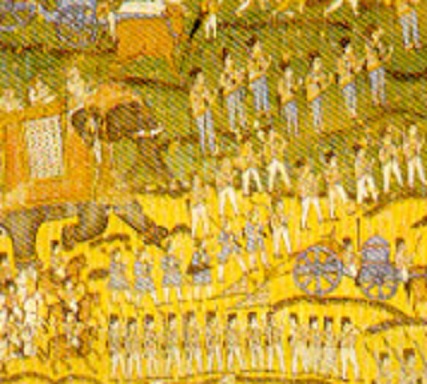Tunga, battle of
This is a collection of articles archived for the excellence of their content. |
History
From the archives of "India Today", May 18, 2009
Uday Mahurkar
An 18th-century battle at Tunga-Madhogadh, near Jaipur, that shook north India is still fondly remembered by local residents. The battle was fought on July 28, 1787, between the forces of legendary Maratha General Mahadji Sindhia and the Rajputs of Jaipur and Jodhpur, led by the then Jaipur Raja, Sawai Pratapsinghji.
It was the only battle of the many waged by Sindhia in Rajputana that he didn’t win in his 42-year eventful military career. The local people celebrate this fact under the aegis of the Yuva Chetna Manch and the Battle of Tunga Foundation in a grand fashion on July 28 every year.
Every Saturday, local people offer prayers at the cenotaph of two Rajput warriors—Rao Surajmal of Bissau and Bakhtawar Singh Rathore of Borawad—who died in the battle.
As Sharma says: “We want the memory of that heroic battle to arouse the military spirit among youth in these times of threats to national security.” The outskirts of Tunga-Madhogadh still bear the marks of war. Digging into the earth in this region often uncovers bones, swords and other weapons—signs of the historic battle that is also famous for the crucial role played by renowned French General De Boigne who fought on the Maratha side.
Though the battle ended on a no-win-no-loss note, with the Rajputs claiming the upper hand, military historians remember it for the skill with which Sindhia withdrew from the battlefield after being hemmed in by the Rajputs and finding a section of his soldiers deserting him.
Sindhia, who fought along with leading commanders like Ingle, Shitole, Jadhav, Chitnis, Pagnis, Phalke, Bakshi, Kadam and Mahurkar, was advised by his captains to seek a truce and avoid a complete rout but the general refused to give in and managed to extricate himself with his military genius. As Gwalior-based historian Abaji Rao Phalke says: “The withdrawal that Sindhia staged amidst his own sullen soldiery is regarded as a classic retreat under pressing circumstances.

